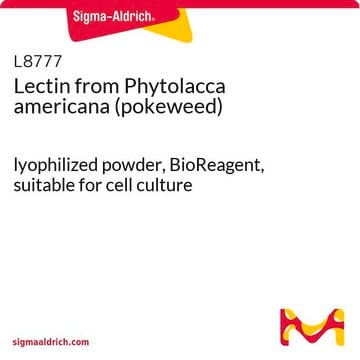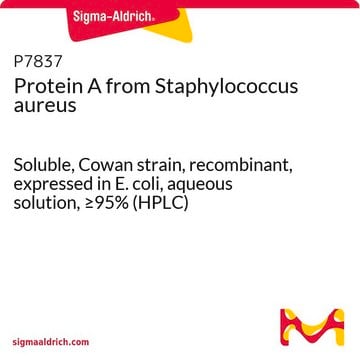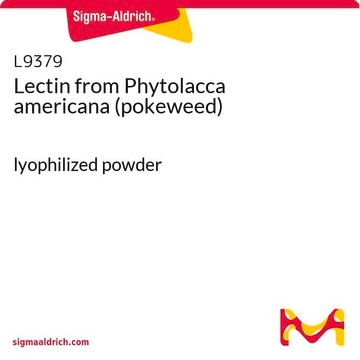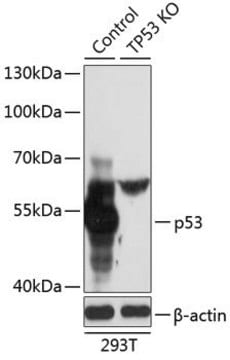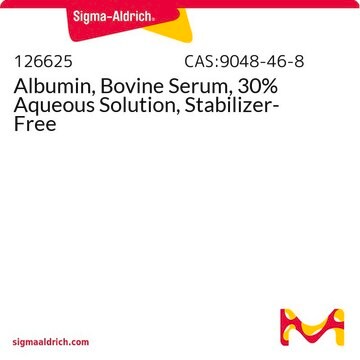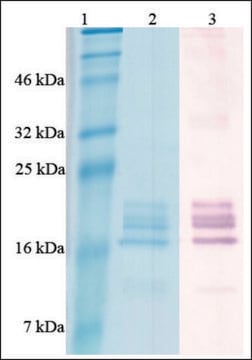507858
PANSORBIN® Cells
Szinonimák:
Staphylococcus aureus Cells
Bejelentkezésa Szervezeti és Szerződéses árazás megtekintéséhez
Összes fotó(1)
About This Item
UNSPSC kód:
41116133
NACRES:
NA.42
Javasolt termékek
form
suspension (Homogeneous)
Minőségi szint
gyártó/kereskedő neve
Calbiochem®
tárolási körülmény
do not freeze
szennyeződések
≤2500 cells/mL Viable cells
szín
milky
kapacitás
≥2.0 mg(human IgG/100 mg cells)
kiszállítva
ambient
tárolási hőmérséklet
2-8°C
Általános leírás
PANSORBIN Cells are heat-killed, formalin-fixed Staphylococcus aureus cells that have a coat of protein A and have been pickled by the method of Kessler. Useful for mitogenic stimulation of B lyphocytes and for immunoprecipitation.
Heat-killed, formalin-fixed Staphylococcus aureus cells (Cowan I strain) that bear a high cell-surface density of protein A and have been pickled by the method of Kessler. Useful as a solid-phase IgG-binding reagent due to the high affinity interaction of protein A with the Fc domain of IgG. PANSORBIN cells work best when the antibody is human (IgG1, IgG2, IgG4), rabbit IgG (all isotypes), or mouse (IgG2a, IgG2b, IgG3). Most common applications include immunoprecipitation and mitogenic stimulation of B lymphocytes.
Figyelmeztetés
Toxicity: Standard Handling (A)
Fizikai forma
Supplied as a 10% suspension of Staphylococcus aureus cells in PBS, 0.1% NaN₃, pH 7.2.
Egyéb megjegyzések
Kierszenbaum, F., et al. 1991. Immunology74, 317.
Meikle, P.J., et al. 1991. J. Biol. Chem.266, 22569.
Ezaki, O., et al. 1989. Biochem. Biophys. Res. Commun. 159, 1368.
Murakami, H., et al. 1988. Biochem. J.256, 917.
Kessler, S.W. 1975. J. Immunol. 115, 1617.
Meikle, P.J., et al. 1991. J. Biol. Chem.266, 22569.
Ezaki, O., et al. 1989. Biochem. Biophys. Res. Commun. 159, 1368.
Murakami, H., et al. 1988. Biochem. J.256, 917.
Kessler, S.W. 1975. J. Immunol. 115, 1617.
Jogi információk
CALBIOCHEM is a registered trademark of Merck KGaA, Darmstadt, Germany
PANSORBIN is a registered trademark of Merck KGaA, Darmstadt, Germany
Figyelmeztetés
Warning
Figyelmeztető mondatok
Óvintézkedésre vonatkozó mondatok
Veszélyességi osztályok
Acute Tox. 4 Oral
Tárolási osztály kódja
12 - Non Combustible Liquids
WGK
WGK 3
Lobbanási pont (F)
Not applicable
Lobbanási pont (C)
Not applicable
Analitikai tanúsítványok (COA)
Analitikai tanúsítványok (COA) keresése a termék sarzs-/tételszámának megadásával. A sarzs- és tételszámok a termék címkéjén találhatók, a „Lot” vagy „Batch” szavak után.
Már rendelkezik ezzel a termékkel?
Az Ön által nemrégiben megvásárolt termékekre vonatkozó dokumentumokat a Dokumentumtárban találja.
Az ügyfelek ezeket is megtekintették
Derek Walsh et al.
Genes & development, 20(4), 461-472 (2006-02-17)
Recruitment of the 40S ribosome to the 5' end of a eukaryotic mRNA requires assembly of translation initiation factors eIF4E, the cap-binding protein, together with eIF4A and eIF4G into a complex termed eIF4F. While the translational repressor 4E-BP1 regulates binding
J R Faust et al.
Proceedings of the National Academy of Sciences of the United States of America, 79(17), 5205-5209 (1982-09-01)
UT-1 cells are a clone of Chinese hamster ovary cells that were selected to grow in the presence of compactin, a competitive inhibitor of 3-hydroxy-3-methylglutaryl-coenzyme A reductase [mevalonate: NADP+ oxidoreductase (CoA-acylating), EC 1.1.1.34]. These cells have 100- to 1,000-fold more
Yu-Jun Wang et al.
Nature communications, 14(1), 7903-7903 (2023-12-01)
Ample evidence has suggested the stress etiology of depression, but the underlying mechanism is not fully understood yet. Here, we report that chronic social defeat stress (CSDS) attenuates the excitatory output of the claustrum (CLA) to the prelimbic cortex (PL)
T A Bunch et al.
Nucleic acids research, 17(23), 9761-9782 (1989-12-11)
Genes producing antisense RNA are becoming important tools for the selective inhibition of gene expression. Experiments in different biological systems, targeting different mRNAs have yielded diverse results with respect to the success of the technique and its mechanism of action.
Leah S Bernstein et al.
Methods in molecular biology (Clifton, N.J.), 237, 195-204 (2003-09-23)
Palmitoylation refers to the covalent attachment of a 16-carbon fatty acid to cysteine residues of proteins. This modification occurs on many intracellular signaling proteins including regulators of G protein signaling proteins (RGS). Palmitoylation mediates the interaction of proteins with membranes
Tudóscsoportunk valamennyi kutatási területen rendelkezik tapasztalattal, beleértve az élettudományt, az anyagtudományt, a kémiai szintézist, a kromatográfiát, az analitikát és még sok más területet.
Lépjen kapcsolatba a szaktanácsadással